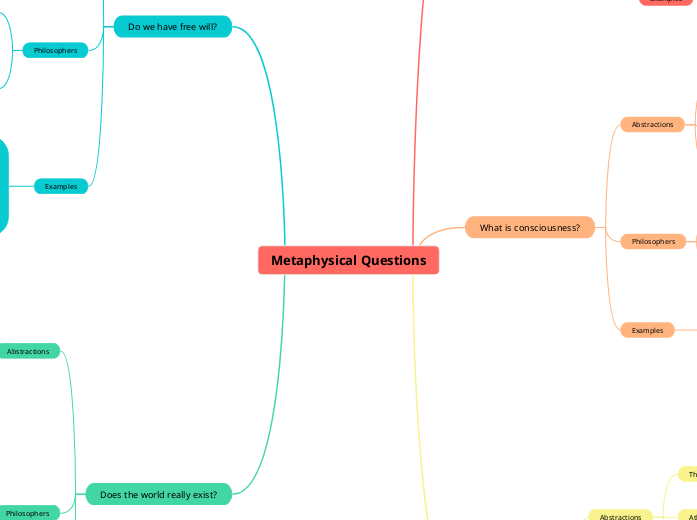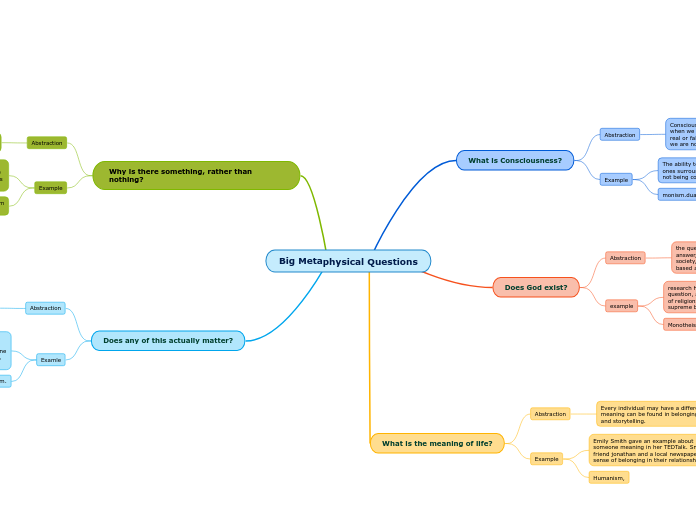Metaphysical Questions
Does the world really exist?
The existence of the world comes into question when debating topics like virtual reality and simulated experiences, one is forced to debate against the bounds of reality compared to real life. Philosophy in popular culture represents perplexity regarding what is reality and what is just an illusion; a good example can be drawn from the movie The Matrix. Thirdly, modern debates in the field of science, particularly quantum physics, test one's outlook on existence by making one question what the nature of existence really is.
John Locke
John Locke, on the other hand, had a more realist view of things: the world is independent, and our senses are one of the useful ways of knowing it. He held that our experiences, though subjective, are an emanation from an outside real world in which we study.
George Berkeley
As George Berkeley famously said, "To be is to be perceived"; for something to exist, it has to be observed. This form of idealism by Berkeley indicates that the independent existence of objects does not in reality exist but in observers' minds.
Solipsism
Solipsism is the philosophical theory that only one's mind is sure to exist. It raises questions of the certainty of external reality and questions the individual to consider the limitation of perceptions, entailing a deep skepticism that anything other than one's own consciousness exists.
Realism
Realism says the world out there is independent of our perceptions and beliefs. Realism supposes an actual world, comprehensible through observation and scientific inquiry; it promotes a view of the world based on empirical evidence.
Idealism
Idealism considers reality to be fundamentally mental or immaterial and postulates that our experience of an outer world is the product of our minds and perceptions. That would have to imply that there can be no independent reality, but our concept of existence is mediated through consciousness.
Do we have free will?
Free will is one of those concepts that often arises when issues of accountability arise in criminal justice, since it comes to the question of how much a person is personally responsible for their actions. Personal stories of overcoming adversity abound; these testify regarding popularly held views on free will. Research in psychology and neuroscience also tackles how unconscious influences operate in our choice-making to further complicate how people think about free will and personal agency.
David Hume
David Hume did not believe that free will and determinism are mutually exclusive. He said human behavior might be influenced by past experiences and other factors, but that one still perceived choices. He concluded that an approach to free will should stress the ability to act on one's desires and motives, even though those themselves are causally determined.
Baruch Spinoza
Baruch Spinoza challenged traditional views of free will by proposing that everything, including human behavior, is part of a deterministic system governed by natural laws. He emphasized understanding our desires and actions through reason rather than seeing ourselves as having free will.
Libertarianism
Libertarianism says that individuals actually do have free will, but, in general, it focuses on being able to decide matters independently. It says our choices are not completely determined; we, in fact, do have an active ability to be in control of our lives.
Compatibilism
Compatibilism seeks to make free will compatible with determinism, maintaining that people can have free will even in the face of a causally determined universe. To act freely, according to this conception, is to act on one's desire and intention in at least the absence of external constraint and impediment, where these desires could be caused by previous causes.
Determinism
Determinism is the view that everything that occurs, including all human actions, is the inevitable outcome of what has taken precedence in the past and the laws of nature. This doctrine holds that we do not have free will because our decisions emanate from sources beyond our control, such as our genes, environment, and upbringing.
Does God exist?
The debate over God's existence is reflected in religious texts, personal testimonials, and philosophical discussions. Many individuals share transformative experiences attributed to divine influence, while ongoing philosophical discourse continues to shape public understanding of spirituality.
Immanuel Kant
Immanuel Kant proposed that while God's existence cannot be proven, belief in God is essential for moral reasoning and understanding ethical behavior.
David Hume
David Hume questioned the rational basis for religious belief, emphasizing empirical evidence and skepticism towards theistic claims.
Agnosticism
Agnosticism holds that the existence of God is unknowable, advocating for intellectual humility and an open exploration of spiritual questions.
Atheism
Atheism rejects belief in any deity, emphasizing reason and ethics without reliance on divine authority, encouraging individuals to find meaning through human experiences and contributions.
Theism
Theism suggests that a divine being or beings exist and are actively involved in the world, providing moral guidance and purpose to believers.
What is consciousness?
The exploration of consciousness is evident in neuroscience studies examining brain function and altered states of awareness. Personal accounts, such as near-death experiences and meditation practices, provide insights into the complexities of consciousness and challenge our understanding of reality.
Edmund Husserl
Edmund Husserl developed phenomenology, emphasizing the importance of subjective experience and how consciousness shapes our understanding of the world.
Daniel Dennett
Daniel Dennett represents the position of the variant of materialism through the claim that the mind is a product of the complex interaction of neurons rather than a self-uniting entity.
Phenomenology
Phenomenology focuses on the subjective experience of consciousness, exploring how individuals perceive and interpret their realities.
Materialism
Materialism asserts that consciousness arises solely from physical brain processes, emphasizing the importance of neuroscience in understanding thought and experience.
Dualism
Dualism posits that the mind and body are distinct entities, raising questions about the nature of self-awareness and the relationship between mental states and physical processes.
What is the meaning of life?
Examples
Real-life examples of finding meaning are more often associated with a personal story of overcoming, as seen in movies such as The Pursuit of Happyness. Many people share experiences where by learning from trials or losses brings finer details to their purpose. In addition, discussions revolving around mental health raise awareness about creating significance in life, or a universal striving for meaning.
Philosophers
Abraham Maslow
The concept of self-actualization by Abraham Maslow was presented in a hierarchy of needs whereby the meaning of life is pursued by actually realizing one's potential or striving for personal growth. His framework, however, has so far emphasized how the basic needs are indeed necessary to be accomplished for a meaningful life.
Friedrich Nietzsche
Friedrich Nietzsche had disputed the tradition of meaning, purporting that the conventional values in society are no longer powerful. He suggested that in doing so, people can transcend the nihilism-that is, when individuals make their own values and embrace the chaos of existence as an opportunity for personal empowerment.
Abstractions
Humanism
Humanism keeps humanity at the forefront as far as values and human development are concerned. It tries to provide meaning through our relations with other people and our contribution to society. Thus, it encourages people to find meaning in love, creative output, and good works.
Nihilism
Nihilism, however, is more pessimistic in asserting that life has no inherent value or meaning. In this, it often leads to the rejection of conventional moral and religious frameworks, confronting humanity with the absurdity of existence and the futility of its search for meaning.
Existentialism
Existentialism is the belief that life has no meaning; therefore, individuals must create their meaning through valid choices and experiences. The existentialism philosophy reaches to an individual's absolute responsibility and freedom in dictating his or her essence through actions and decisions.









